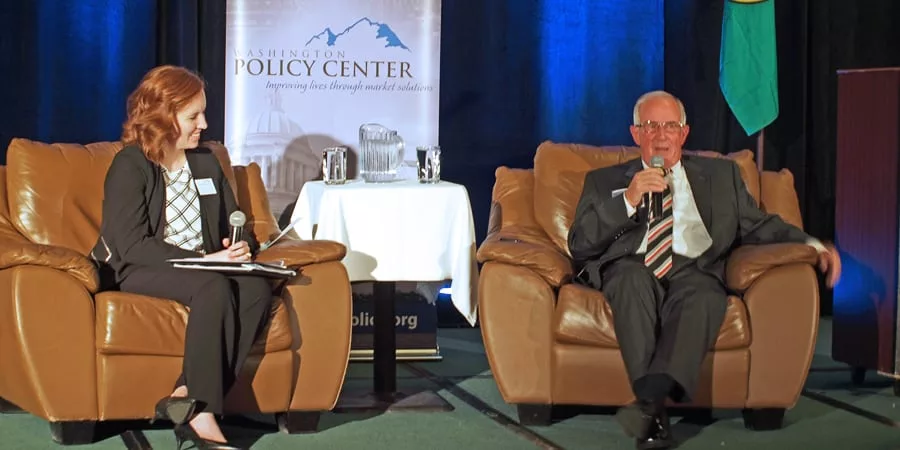
Home » Ag community meets to hear updates on farm bill, ag reform strategies
Ag community meets to hear updates on farm bill, ag reform strategies

February 13, 2018
Washington Policy Center’s Farm to Free Market event in Pasco attracts 300 people
Components of the 2018 farm bill, an economic model based on the success of New Zealand’s sweeping reform, and the ongoing battle to protect assets and existing legislation that supports agricultural producers were among the topics highlighted at Washington Policy Center’s second annual Farm to Free Market dinner.
It’s all about drawing on the “knowledge and experience of those that work the land to develop solutions,” said Dann Mead Smith, Washington Policy Center president.
The Feb. 8 event, held at the Pasco Red Lion, attracted nearly 300 growers, orchardists, farmers, cattlemen, business owners, elected officials and citizens from around the state.
U.S. Congresswoman Cathy McMorris Rodgers and Maurice McTigue of George Mason University’s Mercatus Center were keynote speakers,
Discussion about the 2018 farm bill inspired talk of a way forward for the struggling agricultural sector through strategic economic reform.
The possibility of a federal government shutdown and an ongoing budget debate kept McMorris Rodgers at the Capitol. She instead shared a pre-recorded video to answer questions submitted by attendees via email.
“Three priorities for the farm bill are protecting access to crop insurance, increasing market development and agricultural research. … All of these will make it easier for our farmers to feed all of us,” McMorris Rodgers said.
With the need for food production to double by 2050 to keep up with demand, coupled with 59 years old being the average age of American farmers, it’s becoming more urgent to encourage production by “increasing access and opportunities for the next generation of farmers,” McMorris Rodgers said.
She said the new tax reform is a step in the right direction, enabling farmers large and small to invest, thereby improving their ability to compete.
McMorris Rodgers serves on the Energy and Commerce Committee and played a key role in the 2014 farm bill, which advanced critical research priorities for Eastern Washington farmers and researchers at the Washington State University.
McTigue said the 2018 farm bill should aim to eliminate unhelpful subsidies: “You have to make sure (subsidies) are producing the result you want.”
The former farmer was selected to speak because of his role as a cabinet minister and member of the New Zealand parliament — 40 percent of which were farmers — and his work with the country’s governmental and economic reform achieved through market-driven, pro-growth policies.
McTigue now serves as vice president of outreach for the Mercatus Center, a university-based research center in Virginia, which aims to bridge the gap between academic ideas and real-world problems.
McTigue is the director of the center’s Government Accountability Project and a member of the Spending and Budget Initiative and State and Local Policy Project, through which he has advised and interacted with a number of federal agencies and state governments.
He said because of New Zealand’s extensive economic reform “industries have done so much better now that they’re out from under the government, which was forcing them to make decisions not necessarily good for them.”
A part of New Zealand’s reform included slashing the size of the governmental bureaucracy and cutting all government farm subsidies in 1985, which McTigue said involved placing trust in the market.
“Markets will actually do the right thing if you let them,” he said.
“People are adaptable,” he added. “If you get government out of the road, then people do exciting, entrepreneurial things.”
It was ingenuity and the reconfiguration of traditional approaches to the economy which allowed New Zealand to re-invent itself and thrive, he said.
“It’s putting money into new ideas that start new industries,” McTigue said.
McTigue cited examples such as implementing a water market, which assigns rights to the user, moving farms and ranches to non-traditional yet suitable, terrain, and removing all tariffs and import protections to ensure competitive pricing.
The most important lesson McTigue said he learned about committing to reform was to take action.
“You might not get the perfect solution put together by the (plan) designers, but the important part is getting it done,” he said.
McMorris Rodgers said keeping up with the latest science, technology and industry innovations are key.
She said the expansion of broadband internet into rural areas is of particular importance when it comes to modernizing the agricultural system, since it enables farmers to keep closer tabs on crucial growing factors such as soil moisture levels.
McTigue said one of the major keys to New Zealand’s success was maximizing profit over yield.
Contrary to some anti-North American Free Trade and Trans-Pacific Partnership trade agreement rhetoric coming from the White House, he and McMorris Rodgers emphasized the critical importance of obtaining and broadening access to international markets.
“Washington is the most trade-dependent state in the country,” accounting for $340 billion in exports, McMorris Rodgers said. “Pulling out of TPP and NAFTA is not the right direction; we’re losing markets that took many years to develop and will take many more to get back.”
Trade is critical to Washington growers, since 95 percent of its customer base lies outside the U.S.
In the coming year, the Washington Policy Center plans to reach out to more farmers and producers to assess the effects of the 2017 agricultural labor shortage.
The team also will continue to speak out on critical issues, such as improved water policies for rural farmers, the dissolution of piece rate pay, and the debate over the removal of Snake River dams, which could impact irrigation and a valuable trade route for local producers.
The Washington Policy Center is a nonprofit, nonpartisan, public policy research organization.
Though it’s been around for more than 20 years, the think tank established its agricultural research center in 2016, with the help of seed money provided by Pasco business owner Bob Tippett of The Tippett Co., a Pasco real estate brokerage and services firm.
The center’s agriculture initiative has more than doubled its annual budget since its inception, with $253,000 raised to date. Its three-year goal is to raise $500,000.
“Ideas from WPC’s research centers are regularly implemented by voters and the Legislature,” said Chris Cargill, director for the center’s Eastern Washington office. He also said policy center officials appear in the media, on average, seven times a day in the state.
The Washington Policy Center’s new Tri-City satellite office is at 8905 W. Gage Blvd., Suite 100. An open house is planned in the spring.
Local News
KEYWORDS february 2018





